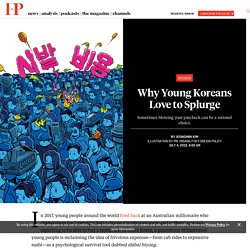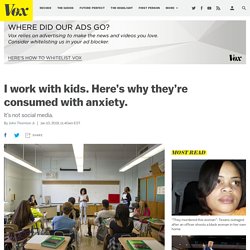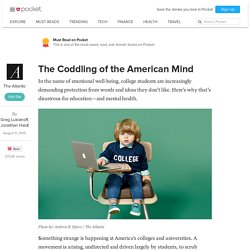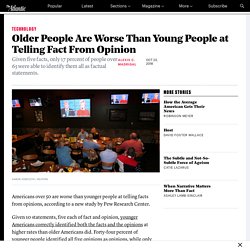

- The Washington Post. Why Young Koreans Love to Splurge. In 2017, young people around the world fired back at an Australian millionaire who chided them for “spending $40 a day on smashed avocado and coffees” and still expecting to be able to buy a home.

But in South Korea, a generation of frustrated young people is reclaiming the idea of frivolous expenses—from cab rides to expensive sushi—as a psychological survival tool dubbed shibal biyong. Loosely translated to “fuck-it expense,” the term is a compound noun combining shibal (a swearword for frustration) and biyong (expense). It first appeared in late 2016, with the earliest tweet about it referring to “an expense that I would not have spent if I weren’t under stress,” such as “an impulsive food delivery or a cab ride.”
The post caught on, and the term was named “neologism of the year” by several South Korean media outlets. First wave of millennials is about to turn 40. Financial checkup time. Why Is Gen Z Obsessed with The Office? Would American Psycho be published today? How shocking books have changed with their readers. Bret Easton Ellis received 13 death threats before American Psycho was even published.

He had to sign a declaration saying he had read them all. That way, if somebody did murder him, his parents couldn’t sue the publisher. This was in 1991. “I would not have the impulse to write that book again,” Ellis says now, during a visit to the Guardian. “It came from that time and place ... Ellis’s publisher, Vintage, had only taken on the book because its original publisher, Simon & Schuster, withdrew at the last minute. Ellis seemed bemused at the time, and not apologetic. In retrospect, American Psycho, and perhaps Michel Houellebecq’s 1998 novel Atomised, look like the end of a long line. Why some Japanese pensioners want to go to jail.
Japan is in the grip of an elderly crime wave - the proportion of crimes committed by people over the age of 65 has been steadily increasing for 20 years.

The BBC's Ed Butler asks why. At a halfway house in Hiroshima - for criminals who are being released from jail back into the community - 69-year-old Toshio Takata tells me he broke the law because he was poor. He wanted somewhere to live free of charge, even if it was behind bars. "I reached pension age and then I ran out of money. So it occurred to me - perhaps I could live for free if I lived in jail," he says. "So I took a bicycle and rode it to the police station and told the guy there: 'Look, I took this.'" The plan worked.
Are you a robot? Anxiety and burnout: I work with kids. Here’s why they’re consumed with worry. While on a youth retreat with my church a few months ago, I asked about 10 kids, ages 13 to 18, to take a few minutes and write down three words to describe what their lives felt like.

They go to a variety of schools, from private and religious to urban public and magnet, and come from a range of backgrounds. After a few minutes writing down their answers silently, we sat in a circle in the living room of our rented cabin and began sharing. One student wrote on a whiteboard each word that the group agreed aptly described their lives. The Coddling of the American Mind - The Atlantic - Pocket. Something strange is happening at America’s colleges and universities.

A movement is arising, undirected and driven largely by students, to scrub campuses clean of words, ideas, and subjects that might cause discomfort or give offense. Last December, Jeannie Suk wrote in an online article for The New Yorker about law students asking her fellow professors at Harvard not to teach rape law—or, in one case, even use the word violate (as in “that violates the law”) lest it cause students distress.
In February, Laura Kipnis, a professor at Northwestern University, wrote an essay in The Chronicle of Higher Education describing a new campus politics of sexual paranoia—and was then subjected to a long investigation after students who were offended by the article and by a tweet she’d sent filed Title IX complaints against her. In June, a professor protecting himself with a pseudonym wrote an essay for Vox describing how gingerly he now has to teach. Older People Are Worse Than Young People at Telling Fact from Opinion. Earnest critiques of the facts and opinions that Ziegler put into the world as if he were a journalist made no sense.

“Maybe it’s better to say that he is part of a peculiar, modern, and very popular type of news industry, one that manages to enjoy the authority and influence of journalism without the stodgy constraints of fairness, objectivity, and responsibility that make trying to tell the truth such a drag for everyone involved,” Wallace concluded. Sound familiar to anyone? While talk radio caters to all tastes, the medium developed to serve an audience Pew described in 2004 as “a distinct group; it is mostly male, middle-aged, well-educated and conservative.” That cohort is now over 50, and its members spent decades listening to radio hosts stimulate by mixing facts and opinions in whatever proportion was necessary to keep listeners from turning the dial.
Read: This article won’t change your mind.